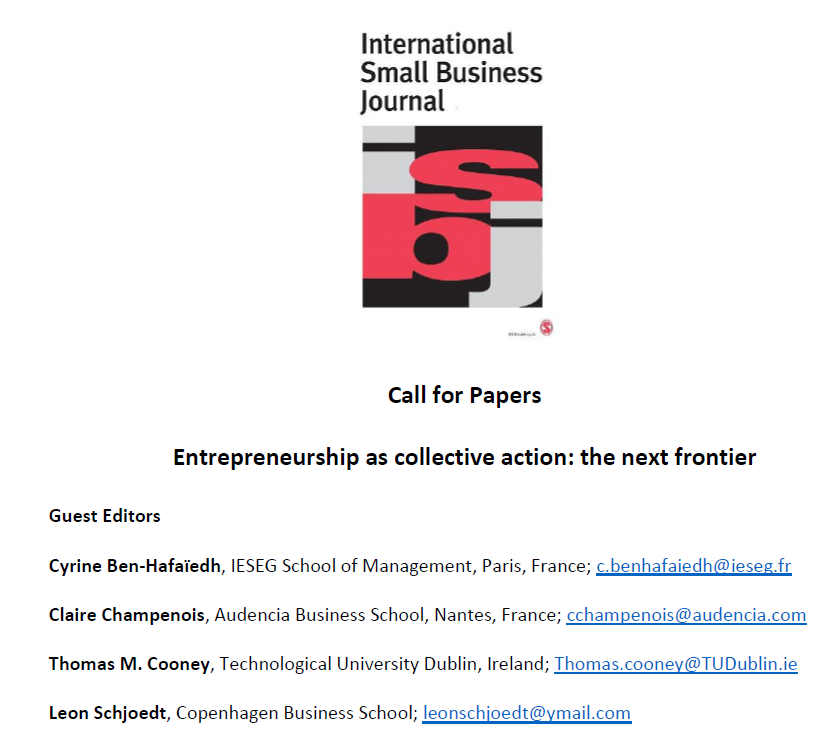CfP ISBJ – Entrepreneurship as collective action: the next frontier – Deadline 31 May 2022
Call for Papers
Entrepreneurship as collective action: the next frontier
Guest Editors
Cyrine Ben-Hafaïedh, IESEG School of Management, Paris, France; c.benhafaiedh@ieseg.fr
Claire Champenois, Audencia Business School, Nantes, France; cchampenois@audencia.com
Thomas M. Cooney, Technological University Dublin, Ireland; Thomas.cooney@TUDublin.ie
Leon Schjoedt, Copenhagen Business School; leonschjoedt@ymail.com
Entrepreneurship research is moving away from the concept of a heroic individual (Drakopoulou Dodd & Anderson, 2007; Ogbor, 2000) towards a more collective endeavour. Over the last two decades, a strong stream of research has developed highlighting the importance of entrepreneurial teams and of their collective dynamics (Ben-Hafaïedh, 2017; Cooney, 2005; Piva & Rossi-Lamastra, 2017; Preller, Patzelt, & Breugst, 2020; Schjoedt & Kraus, 2009). More recently, as entrepreneurship scholars expand the boundaries of entrepreneurship research (Johnson & Schaltegger, 2019; Wiklund, Wright, & Zahra, 2019), the collective perspective is gaining traction through prosocial organising research (Branzei, Parker, Moroz, & Gamble, 2018; Castellanza, 2020; Doh, Tashman, & Benischke, 2019; Hertel, Binder, & Fauchart, 2021; Wigger & Shepherd, 2020). Under widely different labels such as ‘social entrepreneurship’ (Chatterjee, Cornelissen, & Wincent, 2021; Kimmitt & Muñoz, 2018), ‘community-based entrepreneurship’ (Murphy, Danis, Mack, & Sayers, 2020; Seyb, Shepherd, & Williams, 2019), ‘activist entrepreneuring’ (Dey & Mason, 2018), ‘collective entrepreneurship’ (Dufays & Huybrechts, 2016; Meyer, 2020) and ‘impact entrepreneurship’ (Markman, Waldron, Gianiodis, & Espina, 2019), an emerging array of contributions are challenging the existing understanding of entrepreneurship and arguing that it can also be considered as a social force of change instigated by a group of people in collective action.
Some vibrant, yet disconnected, conversations about entrepreneurship as a collective action have begun. Still, questions remain about how to conceive entrepreneurial collective action, if there are any common features in heterogeneous entrepreneurial collective endeavours, and why entrepreneurship as a phenomenon requires collectives to happen. Furthermore, entrepreneurship theory in general still holds strongly to normative individualistic assumptions. When entrepreneurship theories or paradigms consider the different stakeholders (Sarasvathy, 2001; Shane & Venkataraman, 2000), they still commonly position individual agentic behaviour as the basis for their work. Even when collective action is explicitly mentioned, the individual remains the key unit of analysis (e.g., Sarasvathy & Ramesh, 2019). Ultimately, scholars have yet to absorb the full potential of considering entrepreneurship as a collective action and few contributions adopt a collective stance on key entrepreneurship concepts, such as discovery / construction of opportunity, entrepreneurial alertness, or effectuation.
This Special Issue seeks to establish ‘entrepreneurship as collective action’ as the next frontier. The goal of the Special Issue is to stimulate theory building on entrepreneurship as a collective endeavour by conceptualising and empirically documenting it. We invite contributions that depart from an individualistic perspective (Dimov, 2007), focus on a collective dimension of the entrepreneurial phenomenon, and show how this collective conception challenges, renews and enriches entrepreneurship theorising. The papers of this Special issue will offer an exciting opportunity to begin a profound, maybe even paradigmatic, change within entrepreneurship literature.
The Guest Editors are seeking contributions that embrace both centripetal and centrifugal forces to theory development on collective entrepreneurship (Schad, Lewis, & Smith, 2019). Centripetal forces will contribute to define a conceptual core, by unfolding the multiple meanings of the term ‘collective entrepreneurship’ and by questioning the premises and assumptions regarding entrepreneurship as collective. Centrifugal forces aimed at “challenging the core and extending its boundaries” (Schad et al., 2019, p. 107) will enable researchers to rethink many key current entrepreneurship theories, concepts, and topics by applying a collective action perspective (Alvarez, Audretsch, & Link, 2016). For example, focusing on entrepreneurship as collective action (Champenois, Lefebvre, & Ronteau, 2020) offers the potential to advance the literature and one’s understanding of the collective interpersonal dynamics that facilitate entrepreneurship contexts (Bradley, Kim, Klein, McMullen, & Wennberg, 2021; Welter & Baker, 2020). Such a perspective also highlights how collective action may contribute to shaping or even creating entrepreneurial spheres (Lee, Struben, & Bingham, 2018; Pinkse & Groot, 2015).
In order to achieve such ambitions, the Guest Editors are interested in contributions that explore different forms of entrepreneurship as collective action and their underlying practices and processes. Submissions may fit under one of the following broad headings that are meant to be generative rather than exhaustive. We are open to theoretical and empirical papers, using a variety of methodologies.
- Theoretical contributions revisiting and enriching dominant assumptions or theories in entrepreneurship by adopting a collective lens.
- Conceptualisation of entrepreneurial collective action, entrepreneurial collective agency, collective entrepreneurial opportunity, collective effectuation (e.g., drawing from literatures and concepts in other disciplines such as social movements, theories of collective agency and collective action).
- Collective dimension of entrepreneurship across prevailing empirical objects (entrepreneurial teams, collective enterprises, etc.).
- Collective entrepreneurial actions/behaviours/practices.
- What stabilised patterns or institutionalised forms emerge from collective entrepreneurial actions? How are they maintained or challenged over time?
- How do the most recent collective entrepreneurial practices relate to incumbent identified practices (e.g., maker movement, digital entrepreneurship, etc.)?
- Interactions among entrepreneurs and their stakeholders or context as part of collective entrepreneurial process.
- Links between collective entrepreneurship and existing structures/institutions/norms/values
- Unfolding of collective entrepreneurial processes and impacts on performance.
- Contextualisation in collective entrepreneurship.
- Paradoxes and tensions in collective entrepreneurship (e.g., self-interest and the collective).
- Dark sides of collective entrepreneurship.
- Methodological contributions to study collective entrepreneurship and/or entrepreneurial collective action.
The deadline for submission of papers is 31 May 2022. The journal submission site will be open for submissions from 20 May 2022. The Special Issue is scheduled to be published in September 2023. Papers must be original and comply with ISBJ submission guidelines. Please refer to http://isb.sagepub.com/ for submission guidelines and the link to the online submission system. In the online system please ensure you submit your paper within Manuscript Type: ‘Special Issue: Entrepreneurship as Collective Action’.
Questions and informal enquiries should be directed to any of the Guest Editors.
Call for Papers ISBJ_FINAL_Entrepreneurship as Collective Action



















